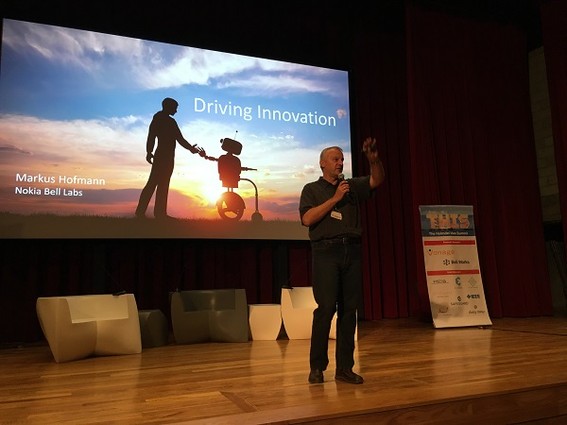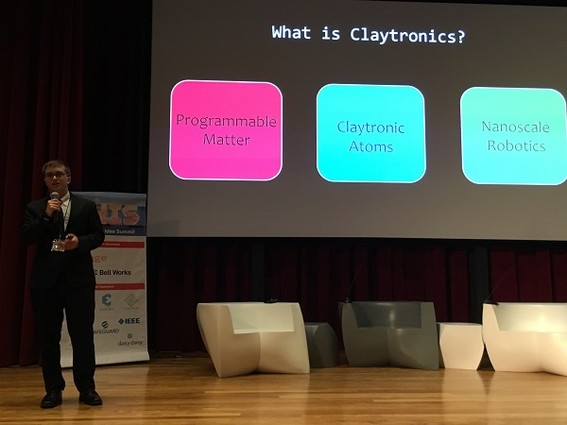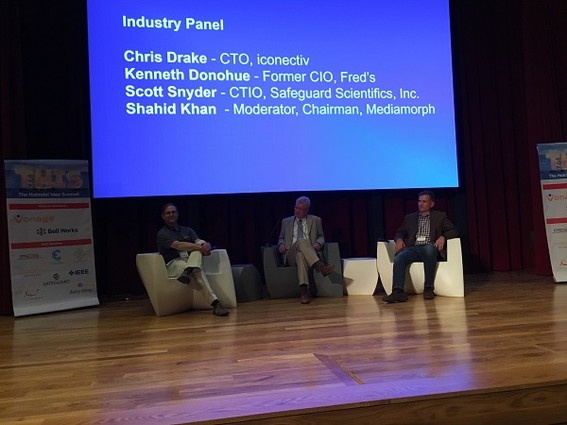Holmdel Idea Summit Celebrates an Explosion of Innovation in New Jersey

This summer, speakers at The Holmdel Idea Summit talked about innovations now and in the future. The summit, which took place at Bell Works (Holmdel), was the brainchild of entrepreneur Sanjay Macwan who has worked on the bleeding edge of technology innovation.
Macwan and his team assembled an impressive group of innovators to talk to the audience. The idea was to showcase innovation happening today in the Holmdel area and to stimulate attendees to expand their minds. “We are a group of passionate entrepreneurs, scientists, and engineers inspired by the rich history of innovations and ongoing pursuit of next big ideas right here in New Jersey,” according to the Idea Summit website.
Michael Abelar, a student at Biotechnology High School (Freehold), delved into the world of claytronics, a new technology that will eventually use programming to change matter into tiny computers that can reassemble themselves to replicate objects. His talk focused on catoms (claytronic atoms) and nanoscale robotics, and he presented scientific literature in these areas, which now seem like science fiction.

A panel of representatives from tech enterprises discussed how new technologies have impacted their companies. They concentrated on artificial intelligence (AI) and the internet of things (IoT), which are currently delivering value. Software is the major disruptor, they said.
Chris Drake, CTO of iconectiv (Bridgewater), said that “you can order Domino’s pizza from your Alexa [Amazon-developed personal assistant], and I think on Friday night that’s a pretty valuable application.” Iconectiv was formerly “Telcordia,” and started its life as “Bellcore.” He added that Alexa now has over 6,000 skills, and a massive developer community is creating about 100 new skills a day. “So, the opportunity to innovate and create a new skill in voice-first artificial-intelligence technology is right there for anybody in this room.”

Moderator Shahid Khan, vice chairman and cofounder of Mediamorph (New York), added that the ability to build on top of things like the iPhone and Alexa democratizes innovation. What’s preventing some companies from opening up to new technologies is the fear that they’ll be more vulnerable to hacks. However, at iconectiv, “we’ve opened up some platforms,” and this does help the company innovate and create a “real stickiness” with the community.
Markus Hofmann, head of application platforms and software systems research at Bell Labs (Murray Hill), gave a talk on innovation, in which he said, “I want to drive technology that changes the world.” When “we talk about evolution at Bell Labs, we talk about disruptive innovation.
“Do not waste your time doing incremental improvements. Think about what the world will look like 10 or 20 years from now, and work back from that.” He added that you should imagine success by the long-term impact. When you propose something that people you talk to think is crazy, that’s true innovation, he said.
Hofmann also spoke about the long-range outlook for technologies that will gain time back. All of the great inventions saved the world time, he said, and are important because time is not renewable, doesn’t grow, and you can’t artificially produce it.
One of the ways Bell Labs looks to free up time is through relentless automation, which, according to Hofmann, doesn’t mean giving up control, but does mean automating tasks so as to free up time. Bell Labs is working on automating the time-consuming task of software programming. People are “spending a lot of time writing software and also debugging it, making sure it’s reliable.” However, there has been an explosion in open-source code that is available to the public, he noted. “We are not even scratching the surface of this software.”
Hofmann believes that every software component needed for projects has already been written. However, the problem is finding it and figuring out how it will fit into a current software project. In the future, artificial intelligence will help programmers search through open-source codes to find an appropriate code that will automatically plug into programs as they are being built, he said.
In another presentation, Urs Muller, director of developer technology software and chief architect-autonomous driving at NVIDIA (Holmdel), talked about neural network software that extracts the main information it needs from an image. This software is being used in self-driving cars that are being tested in Monmouth County.
Joe Redling, then COO of Vonage (Holmdel), took to the Bell Works stage, alongside CNBC’s Kate Rogers, to discuss Vonage’s legacy of disruption and innovation, its New Jersey roots, and the future of innovation within the business communications space. Vonage, which cosponsored the event with Bell Works, has acquired some of its game-changing technology by buying innovative companies.

